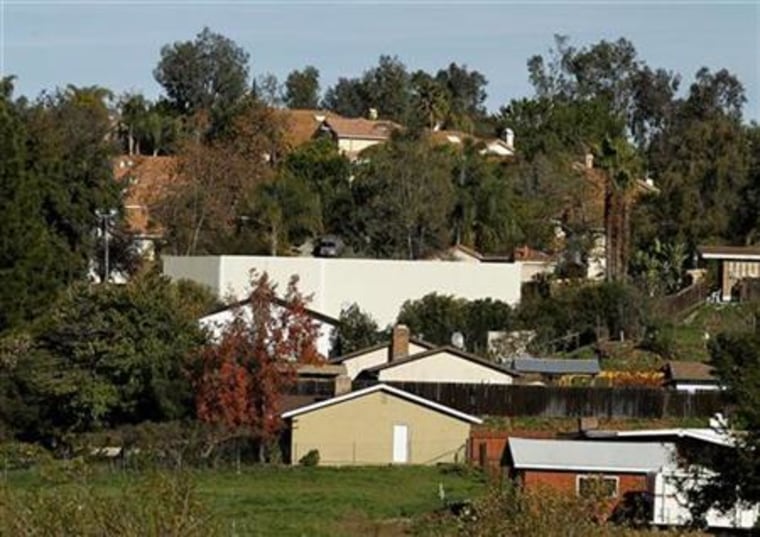A federal judge on Wednesday denied a defense attorney's request to delay destruction of a Southern California home packed with explosives.
The ruling by U.S. District Judge Larry Burns allows authorities to proceed with the controlled burn Thursday of the Escondido home to end any threats to the neighborhood.
Burns ruled after an hour-long hearing in which he heard testimony from an FBI bomb expert that it would be "very irresponsible" to allow anyone in the house.
"I frankly think it's just too dangerous," Burns said.
Defense attorney Michael Berg asked for the delay to retrieve papers that he said would help the defense of his client, George Jakubec.
Jakubec has pleaded not guilty to charges of making destructive devices. Authorities have not said why he had the material.
In legal papers filed before the hearing, prosecutors said a coffee table in the home that authorities have called a bomb factory was covered with a virtual assembly line of detonators and a substance so explosive that it could be set it off by simply shifting nearby papers.
Assistant U.S. Attorney Rees F. Morgan told the judge at Wednesday's hearing that the coffee table was "ground zero" for the home rigged with explosives.
"It is a no-go zone," he said.
Prosecutors contend the only way to safely dispose of the explosives is to burn down the home, which is so cluttered with unstable chemicals that it can not be safely entered — not even by bomb-disposing robots.
Nearly every room in the suburban, ranch-style house is packed with piles of explosive material and other items related to making homemade bombs, prosecutors said in the court papers.
Berg has argued that burning down the home is not the safest solution, and Jakubec may be able to advise officials on the best option. The lawyer also contends the materials inside the home might prove to be harmless or lawfully owned.
Berg said Jakubec, a 54-year-old unemployed software consultant, believes there are journals and other papers in the home that would explain why he had the explosive materials.
The lawyer said authorities have not told the defense whether they retrieved those items, and they should be allowed to see the government's finding before the property is destroyed.
Bomb squad officers who inspected the property believe Jakubec has manufactured so many devices for so long that "even he has forgotten the location and type of explosives stashed throughout the property," prosecutors said in the papers.
Bomb squad officers say they found the same types of chemicals used by suicide bombers and insurgents in Iraq and Afghanistan. The materials included Pentaerythritol tetranitrate, or PETN, which was used in the 2001 airliner shoe-bombing attempt as well as airplane cargo bombs discovered last month by authorities.
The chemicals were found after a gardener accidentally set off an explosion at the home by stepping on what authorities believe was a byproduct of highly unstable Hexamethylene triperoxide diamine, or HMTD.
Investigators said Jakubec admitted dumping the highly unstable substance in the backyard. Even the byproduct of the HMTD chemical process is volatile enough to cause an explosion when gravel is scuffed together, they said.
A bomb squad officer set off another minor explosion in the same area of the yard but escaped unscathed, prosecutors said.
"Bomb technicians were so concerned with the instability of the property that they ordered their colleague to freeze in place when the explosion occurred, and lifted him vertically off that patch of property," prosecutors said in their court filing.
About 40 bomb experts and eight national laboratories have been working on the plan to burn down the home on a half-acre lot near a busy, eight-lane freeway in an unincorporated area north of San Diego.
Crews have built a 16-foot fire wall to protect the closest residence to the bomb-laden house. Scores of nearby residents will be evacuated Thursday, and officials plan to close down a section of Interstate 15 during the burn, which will be monitored by more than a dozen air pollution sensors.
People in another 120 homes are being advised to stay inside with their windows closed.
Officials have not given an estimate on the total amount of explosive material. Bomb squad officers say they found at least nine pounds but had to stop their investigation for safety reasons.
"In short, the property is littered with high explosives, dangerous chemicals, grenades with added fragmentation, explosives-packed detonators and all the makings of a munitions plant," prosecutors said in their court filing.
Jakubec pleaded not guilty Monday to eight federal charges related to making destructive devices and robbing three local banks. He remains jailed without bail and could face 32 to 132 years in prison if convicted.
His gardener, Mario Garcia, 49, suffered eye, chest and arm injuries.
